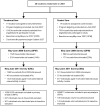The government of Kenya's cash transfer program reduces the risk of sexual debut among young people age 15-25
- PMID: 24454875
- PMCID: PMC3893206
- DOI: 10.1371/journal.pone.0085473
The government of Kenya's cash transfer program reduces the risk of sexual debut among young people age 15-25
Abstract
The aim of this study is to assess whether the Government of Kenya's Cash Transfer for Orphans and Vulnerable Children (Kenya CT-OVC) can reduce the risk of HIV among young people by postponing sexual debut. The program provides an unconditional transfer of US$20 per month directly to the main caregiver in the household. An evaluation of the program was implemented in 2007-2009 in seven districts. Fourteen Locations were randomly assigned to receive the program and fourteen were assigned to a control arm. A sample of households was enrolled in the evaluation in 2007. We revisited these households in 2011 and collected information on sexual activity among individuals between 15-25 years of age. We used logistic regression, adjusted for the respondent's age, sex and relationship to caregiver, the age, sex and schooling of the caregiver and whether or not the household lived in Nairobi at baseline, to compare rates of sexual debut among young people living in program households with those living in control households who had not yet entered the program. Our results, adjusted for these covariates, show that the program reduced the odds of sexual debut by 31 percent. There were no statistically significant effects on secondary outcomes of behavioral risk such as condom use, number of partners and transactional sex. Since the CT-OVC provides cash to the caregiver and not to the child, and there are no explicit conditions associated with receipt, these impacts are indirect, and may have been achieved by keeping young people in school. Our results suggest that large-scale national social cash transfer programs with poverty alleviation objectives may have potential positive spillover benefits in terms of reducing HIV risk among young people in Eastern and Southern Africa.
Conflict of interest statement
References
-
- McCoy S, Watts CH, Padian N (2010) Preventing HIV infection: turning the tide for young women. Lancet 376: 1281–2. - PubMed
-
- Baird SJ, Garfein RS, McIntosh CT, Ozler B (2011) Effect of a cash transfer programme for schooling on prevalence of HIV and herpes simplex type 2 in Malawi: a cluster randomized trial. Lancet doi:10.1016/20140-6736(11)61709-1. - PubMed
-
- Medlin C, de Walque D (2008) Potential application of conditional cash transfers for prevention of sexually transmitted infections and HIV in sub-Saharan Africa. World Bank Policy Research Working Paper No. 4673 The World Bank: Washington DC.
-
- de Walque D, Dow WH, Nathan R, Abdul R, Abilahi F, et al. (2012) Incentivising safe sex: a randomised trial of conditional cash transfers for HIV and sexually transmitted infection prevention in rural Tanzania. BMJ Open 2: e000747 doi:10.1136/bmjopen-2011-000747 - DOI - PMC - PubMed
Publication types
MeSH terms
Grants and funding
LinkOut - more resources
Full Text Sources
Other Literature Sources


